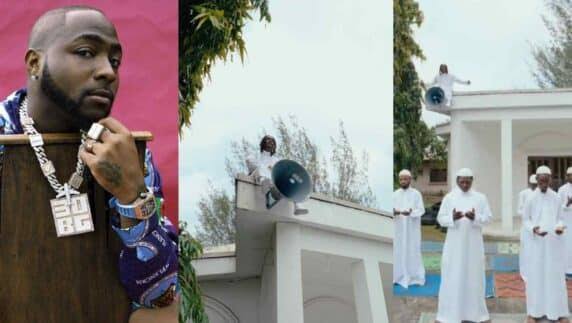Entertainment
Why Yoruba and Hausa Muslims reacted differently to music video shared by Davido

Music star Davido’s social media promotion of a new song by Logos Olori (whose real name is Olalekan Emeka Taiwo) titled “Jaye Lo” where men dressed in stereotypical Muslims robesgyrated into a sudden burst of frenzied dancing shortly after performing the Muslim prayers near a mosque has incensedMuslims in Hausaphone northern Nigeria but doesn’t seem to bother Yoruba and other Nigerian Muslims.

The differential reactions to the music video—and to most other issues involving religion— among Nigerian Muslims can be traced to the history and character of the evolution of Islam in the North and in the Southwest.
It is not often known that Yoruba and Hausa Muslims share a common, age-old heritage even though the manifestation of Islam in the lived experiences of the people is fundamentally different, which is magnified by the often acrimonious political differences between the two groups in contemporary Nigeria.
The emergence of Islam in both societies is not only fairly co-extensive, it is also from the same West African source. Islam came to Katsina, Kano (and in much of Hausaland in Nigeria’s northwest) in a sustained, systematic form in the 1300s. It came to Kano when Yaji I was king of Kano— and to Yorubaland in the 1450s during the reign of Oluaso, the defunct Oyo Empire’s longest reigning monarch on record.
Tarikh arbab hadha al-balad al-musamma Kano, the Arabic-language palace diary known to us in English as the Kano Chronicle, which recorded biographical profiles of Kano’s kings from the 10th century until the Usman Dan Fodio Jihad in the early 1800s, is the first known written account to state that Islam was brought to Kano by the Wangara people of Mali during the reign of Yaji I who ruled from 1349 to 1385.

Islam also came to Yorubaland (and surrounding areas such as Borgu and Nupeland) through the same Wangara people of Mali, which explains why Islam is called “Esin imale” in the Yoruba language, which literally means “religion of Mali.” Note that the Wangara are also known by such names as Mande, Mandinka, Malinke, Mandingo, Dyula, Bambara, Soninke, etc.
Although Islam has existed in Yorubaland since at least the 1400s, the first mosque wasn’t built in Oyo-Ile, the ancient capital of the Oyo Empire, until 1550, and in Iwo, a historic Yoruba Muslim town, until the 1600s. While Islam took enough roots in Yorubaland that Sharia courts were established in some towns, traditional modes of Yoruba worship coexisted with Islam for centuries.
Former Bauchi State governor Isa Yuguda pointed out on April 26, 2013, that “the first Sharia court [in what is now Nigeria] was established in Iwo, in Osun State.”
Many Yoruba Muslims repeat this claim both to show that Islam in Yorubaland has a historical edge over Islam in the North and to persuade the Nigerian government to allow the implementation of Sharia for Yoruba Muslims who desire it.
-

 Gist4 days ago
Gist4 days agoMy Boss Used To ‘KNACK’ My Wife After Sending Me On A Mission, To The Extent She Got… – Ex-soldier
-

 News3 days ago
News3 days agoCooking Gas Price Has Fallen
-

 News5 days ago
News5 days agoFake Reverend Sister Arrested With 38 Children
-

 Politics4 days ago
Politics4 days agoRevealed: What Access Bank Said About Its Dealings With Yahaya Bello
-

 News3 days ago
News3 days agoRead How Auxiliary Was Whisked Away By Masked Security Agents as Family member Speaks
-

 Sports2 days ago
Sports2 days agoFinidi agrees deal with NFF, names three foreign assistants
-

 Politics2 days ago
Politics2 days agoAtiku Says Tinubu’s Son Is A Director In Company Related To Coastal Road Contract
-

 News3 days ago
News3 days agoERA OF GIVING OIL BLOCS TO POLITICIANS AS PATRONAGE IS OVER SAYS LOKPOBIRI




